How do I stop being indecisive?
Why can’t I make decisions anymore?
Lots of people casually joke about being indecisive. Because for many who struggle with chronic indecision, even the most mundane choice can feel overwhelming.
Sandals or sneakers? Spinach or romaine? We often try to bring lightness to the situation by laughing at our own struggles because we don’t know what else to do. We don’t know how to stop being indecisive.
So what happens when indecisive folks have to make those mega-important, life-changing decisions? Well, the truth is that the once cute indecision that allows friends to laugh with us becomes painful and debilitating pretty fast. It can lead to hours or days of time lost.
For some, loved ones may have already moved beyond the “your indecision is adorable,” phase. But the frustration that others feel could never compare to what indecisive people feel themselves.
I really get it — because, for me, it wasn’t cute anymore. I knew what was happening and I was ashamed of it. But I just thought it was a personal weakness, a quirk — part of my personality that I’d never overcome.
But as I got older and advanced in my career, decisions got bigger and bigger. I realized that constantly fighting through indecision was eating up my time. And it definitely wasn’t good for my well-being.
It started affecting my career because it became an invisible barrier to getting my work done. This is what ultimately pushed me to seek out coaching and strategies to stop being indecisive. Once I discovered what worked for me, and got enough practice — I never looked back.
THIS POST MAY CONTAIN AFFILIATE LINKS.
IF YOU MAKE A PURCHASE FROM THESE LINKS, I MAY EARN A SMALL COMMISSION.
CLICK HERE FOR MY FULL DISCLAIMER STATEMENT.
How to Stop Being So Indecisive
#1. Get Over the Stigma of Being Indecisive
If you’re reading this, you’ve probably felt ashamed about your inability to make decisions too. Mostly on an internal level, but let’s be honest, some of us have even been called out by close friends and family who often sit enraged while we stare blankly at a menu. Or maybe as they sit cross-legged on a bed while we try on the 50th outfit.
When our friends and family say “Stop being indecisive and pick one already!” it comes from a good place. Or maybe it comes from hunger or a desire to arrive on time…
Either way, we know they mean well, or they’re joking. But the real shame we feel is nothing to laugh about. We don’t know how to stop being indecisive, and it kills our self-esteem.
So it’s no surprise that one of the most important steps to moving past your indecision is to stop shaming yourself for your hesitant tendencies.
There’s nothing wrong with wanting a good outcome. We all do, it’s human nature. And there’s definitely nothing wrong with taking the time to carefully consider your choices. A critical attitude and attention to detail is a strength! It just needs to be done in a timely fashion.
👉🏽 RELATED POST: How to Make the Right Choice
Stop Feeling Ashamed Of It
Personally, I had to make this reckoning too. I had to realize that shaming myself wasn’t justified. Because my behavior was actually coming from a very good place.
I had to separate my feelings of shame from my very strong desire for the benefits I’d receive after making speedy decisions. I had to dismiss all of these ideas so that I could stop overthinking.
Something that I also had to learn, was to stay vigilant and look out for subconscious shame too. This type of shame can sneak upon us. It shows up as indecisiveness due to self-doubt; when you can’t decide something because you’re not sure if you’re worthy of what you want.
👉🏽 RELATED POST: How to Stop Negative Self-Talk
Another really common type of sneaky shame is thinking of conflict and disagreement as shameful or something to avoid at all costs. This is totally not true!
Lots of clarity and growth come from conflict and confrontation. Sometimes it’s not fun, but it’s essential for growth.
So if you have any feelings of shame about your indecisiveness — banish them now!
#2. Anchor Your Decisions to Your Values
How do you define your values?
Your values are the things that matter most to you. And defining them is the next step to easy-breezy decision-making. Because once you have a clear idea of your values, you can use them to help you decide when you’re stuck.
But lots of us have never sat down to think about what our values actually are. Here’s how you can figure them out and use them to be more decisive.
A. Understand what your personal values are
What are the things that are essential for you to have a good life?
You’d be surprised at how different it is for each individual. So you’ll need to learn how to pay attention to what brings you satisfaction in your day today. And to what makes you sad too.
To figure out your values, you’ll need to be a bit more observant and introspective. Consult different values lists and decide which things resonate with you.
Everyone is different. But to give you an example, after doing this exercise — I discovered that I value things like “adventure” and “freedom,” over “leisure” and “recognition.”
The difference is subtle to an outsider, but having that personal compass has made it so much easier to say “yes” or “no” to countless opportunities.
You can figure out your values on your own, or you can work with a professional. One of the best things I ever did for myself was to work with a life coach to understand mine. So if you have the resources to invest in a coach or even a therapist, then go for it!
👉🏽 RELATED POST: Creating a Personal Mission Statement
B. Make decisions based on which options fit best with your values
The crucial next step is the application of your new knowledge. Once you understand your values, you need to integrate them into your decision-making process.
When you’re stuck, quickly think about how the decision leads to the progress of one or more of your values. This works for situations big and small. Here’s how they’ve helped me in my personal and professional life.
- Small decision example: Deciding to try something new on the menu because I know it counts as a “tiny” adventure.
- Big decision example: Deciding to quit my high-paying job so I could work on my own terms and have more “freedom.”
Now, the big decision examples probably feel more important. So I should also mention that if you’re finding yourself constantly indecisive at work, it could be because of incompatibility or incongruence between your personal values and your career.
But with some practice, you’ll learn to apply or align your values with nearly every decision you make. And once you do, everything will start to feel better and more natural. You’ll learn to make decisions with more ease.
#3. Think the Best Case v. Worst Case Scenario
If effortlessly reflecting on your values before every little decision sounds like a lot right now. That’s normal.
It’s the end goal, but why does it seem so hard? It’s because indecision is rooted in anxiety about the possible outcomes.
So the next time you start to overthink, stop and do the following.
- Understand the scope of the decision. Not all decisions are life and death, so try to bring some lightness to the situation.
- Come up with the worst result that could happen based on your decision. Let your brain go there.
- Come up with the best result that could happen based on your decision. Daydream for a minute.
Let’s say you can’t decide whether or not you should quit your soul-sucking 9-5 job. We know right off the bat that the scope here is pretty serious because it’s a big professional move. But it’s definitely not life and death. Now let’s take it a step further.
👉🏽 RELATED POST: Should I Quit My Job?
Example of Best vs Worst Case
Worst case scenario if you quit: You never find another job, you end up moving back into your parent’s basement. Your student loan and credit card debt grow so much you have to declare bankruptcy. You’re a failure forever.
Best case scenario if you quit: The day after you quit, you happen to discover a post for your dream job. You’re offered the job a week after sending in your application and you never want to change jobs again. You are happy, fulfilled, and rich forever.
Ridiculous, right? But it’s important to let yourself go there. Then you can realize that the outcome you actually get will probably fall somewhere in between.
Maybe you do have to move back in with your parents a little longer than you expected, but you eventually bounce back and gain your independence. Or maybe you do find your dream job pretty fast. You get the offer a few months into unemployment, but eventually, you outgrow the job and have to change again. Life isn’t so black and white.
It’s human to go to these extremes and to focus on past and future negative outcomes. So allow yourself to do it briefly, so you can realize that these hyper negative or hyper positive thoughts aren’t rooted in reality.
But let’s consider this. No one has ever spontaneously combusted when they made a horrible decision and you won’t either. No matter what, you’ll be ok!
#4. Have Confidence in Your Ability to Pivot
This one was huge for me. It’s easy to get caught up in “what if” scenarios. But there’s no way to know what will happen — until it happens.
An alternative way to think about it — is shifting disproportionate time you spend before you make a decision — to time spent later when you are taking stock of the initial outcomes of that decision.
You may not even need this extra time, but it’s liberating to give yourself a grace period to re-assess the results and change your mind. The important thing is that you’ve made the decision and you’ve also set a deadline.
Life is full of some amazing but also pretty horrible surprises and curveballs. So you have to be confident that you will be able to make new decisions when the time comes.
Because at the end of the day, you totally will!
👉🏽 RELATED POST: How to Face Your Fears
#5. Be More Comfortable with Disappointment
This is my least favorite tip! But it’s hands down the most useful and empowering.
For smart, ambitious people — perfection is always tempting. It’s way too easy to fall into the trap of thinking there’s an absolutely perfect way to do everything. The ideal way to achieve the success we dream of.
No matter how good you get at making decisions, there will be times when you end up with very undesirable, bad, sucky, annoying outcomes. Things won’t always go your way. But the important thing to remember is — that it’s ok!
Learn to recognize the difference between utter devastation and minor setbacks. Use these moments of disappointment as a chance to sit with uncomfortable feelings and learn from them. Try to figure out what those emotions are trying to tell you.
And remember everybody struggles after a letdown. We’ve all been there. Binge-watching a telenovela, ignoring text messages from our mom, or eating a pint of vegan ice cream.
Honor your feelings, honor your pajamas. But then move on to your next decision, no matter how big or small.
Decisions Don’t Need to be Tough
Life is so complicated that I’d be lying to you if I said there was a magic formula to make them ALL easy. But I wholeheartedly believe that most of them can be pretty painless. As long as you know what you want, and make a conscious effort to live a life true to your values.
Now, this advice doesn’t work unless you’re brave enough to try it! So, what are you waiting for? Learn how to stop being indecisive, starting today! Test these steps when making decisions big and small. Bring in a friend or someone you trust to help you out.
Get the Right Choice Guide
Sign up to get the tip sheet for making the right choice. This printable includes all ten ways to choose the correct path.
But most importantly, sit with your feelings and thoughts as you go through this process. Always prioritize self-love. Be patient with yourself and give yourself credit, because you’re already doing great!
Do you wonder why you're so indecisive? Want to stop struggling with indecision? Here's how to stop being indecisive forever and take action today. #Indecision #Procrastination #Confidence #Overthinking
How do you stop being indecisive?

More About Guest Contributor
Janene is a psychology nerd and former business consultant turned full-time blogger. She’s a “work to live” evangelist who also enjoys making good money.
Last Updated on July 23, 2024
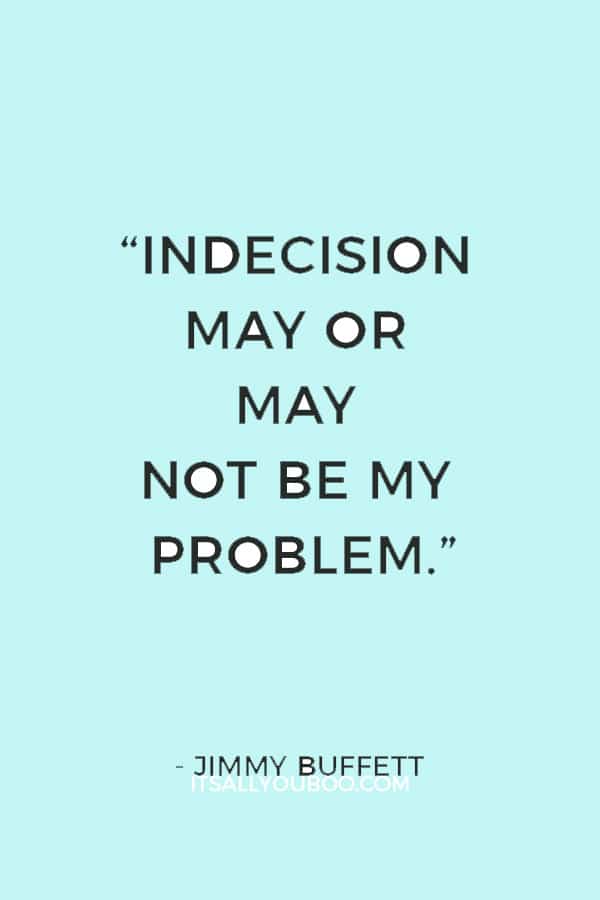
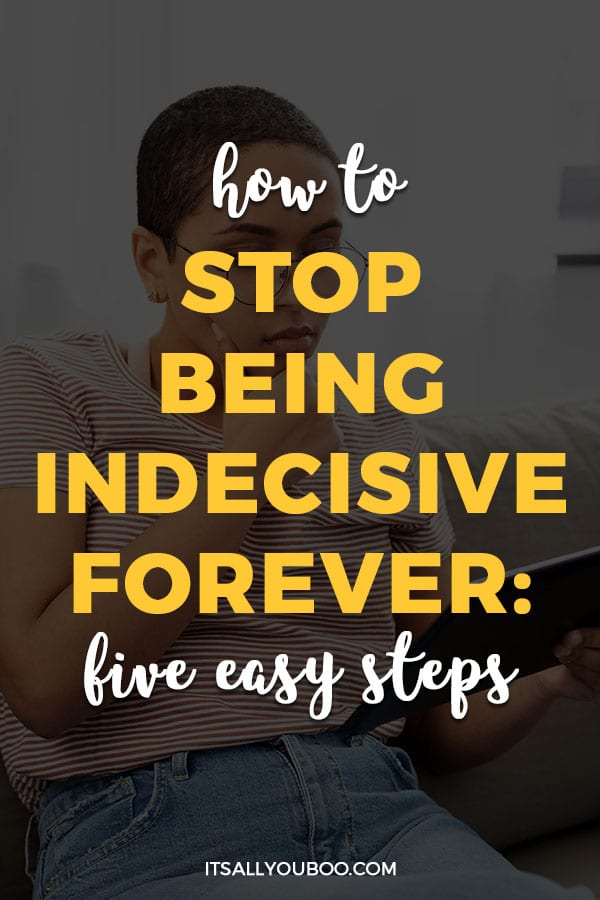
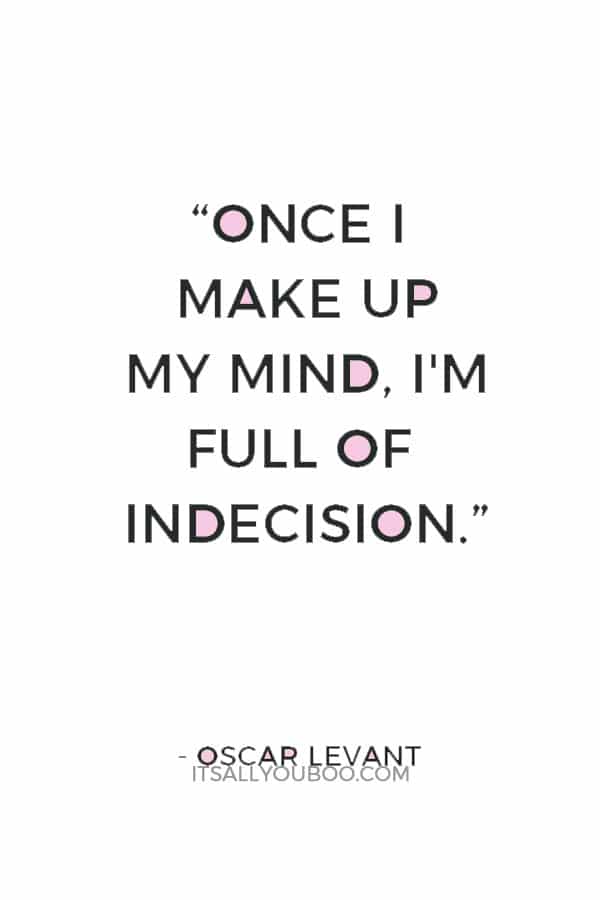




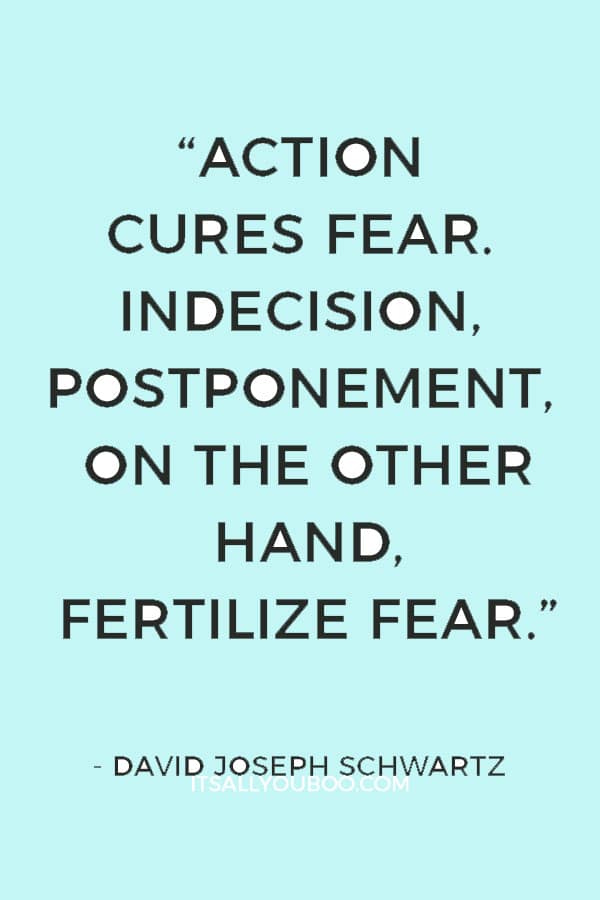
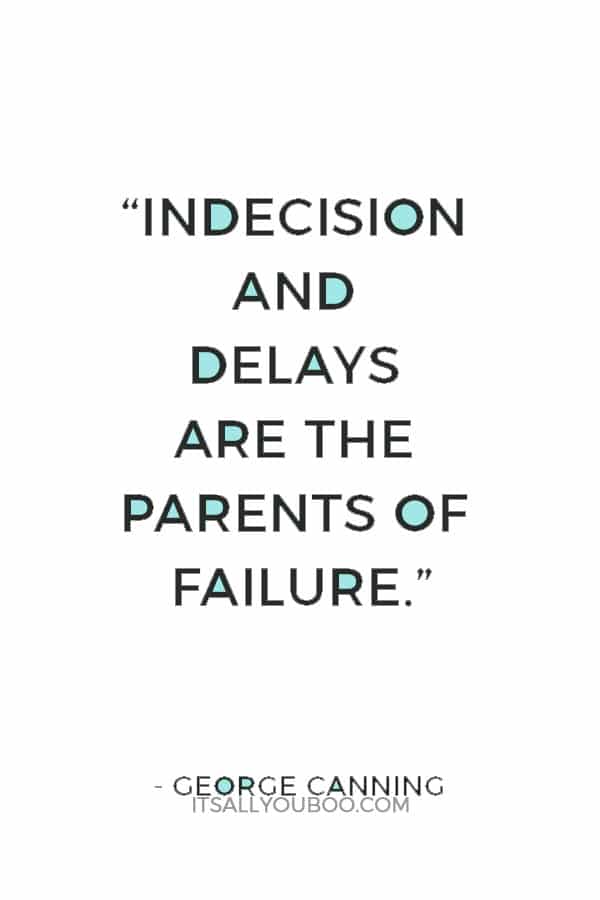



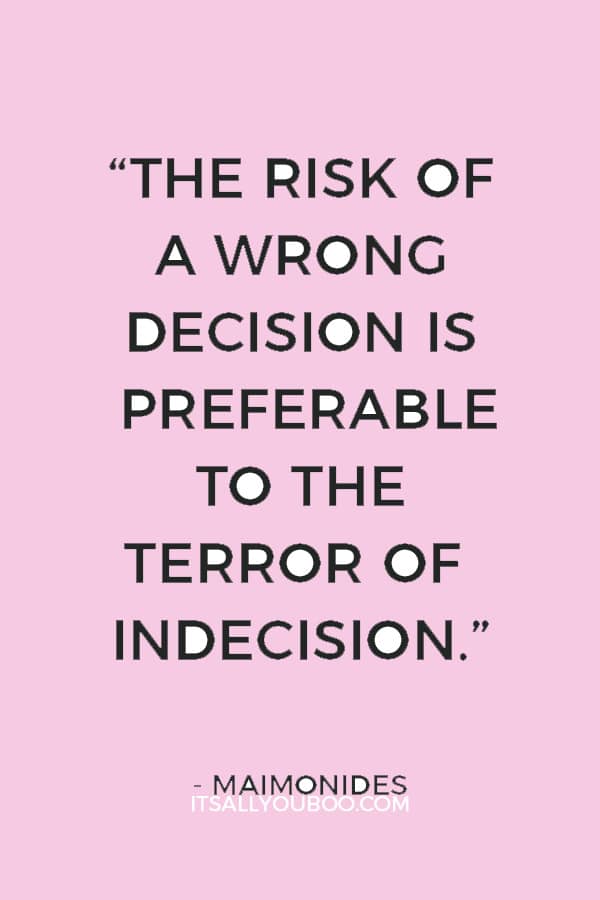





Mimi says
I definitely don’t struggle with, actually, I have the opposite problem, I tend to rush my decisions, any tips on that?
Jae says
That’s an excellent question! I’m curious as to why you feel they are rushed? Do you tend to have regrets after the decisions? Does new information often appear after you’ve made your decisions? Sometimes we can be tough on ourselves. If there’s nothing that really bothers you after you’ve made those decisions, I wouldn’t worry about it too much. Count it as a blessing that your intuition helps you make choices quickly and pivot when you need to!
Nadalie Bardo says
Hey Mimi,
Take it slow. Although if things have worked out pretty well with rushed decision making, I say roll with it. But if they haven’t, take time to figure out why you feel the need to rush. Give yourself permission to think about it for longer before taking action. Like having a 24-hour hold on big life decisions.
Heather says
I like to think that I’m not indecisive, but I’m sure there are certain aspects of my life when I can be.
Nadalie Bardo says
Hey Heather,
I am so indecisive when it comes to little things, like what to eat for dinner. But really quick to action with big life choices. I’m working on being better with the little ones.
Chiell Ann Ordonez says
Great info! I am a pretty bad decision maker myself, I just gotta get over the stigma and start believing in me!
Nadalie Bardo says
Hey Chiell,
Yes, believe in yourself and your ability to make good decisions. I always say the only bad choice, is no choice at all.
Shelbs says
Love this post! Especially about being confident in our ability to pivot!! Turning in another direction is hard especially when you don’t like change.
Nadalie Bardo says
Hey Shelbs,
Me too! We’ve got to have confidence in our ability to figure it out. We can make changes, we can make choices later.
Amber Myers says
I can be indecisive at times. My daughter is REALLY indecisive. It’s hard for her to make a decision sometimes and it’s like “please make one!”
It's All You Boo says
Hi Amber,
Most likely as your daughter gets older she’ll be aware and will learn how to fight her indecisions.
Mimi says
These are amazing tips! I’m lucky I don’t struggle with this
It's All You Boo says
Lucky you, Mimi! You can share this to someone you know if you want. Thanks!
Carissa says
This is great information, and I need to write this somewhere to help myself from time to time! And trust my own decision making!
It's All You Boo says
Hi Carissa,
Glad to be of help! Share this if you can!
Sharon says
I feel like I am fairly confident when I make decisions because the harder ones can leave me second-guessing. Great tips!
It's All You Boo says
Hi Sharon,
That’s great that you confident in making decisions!